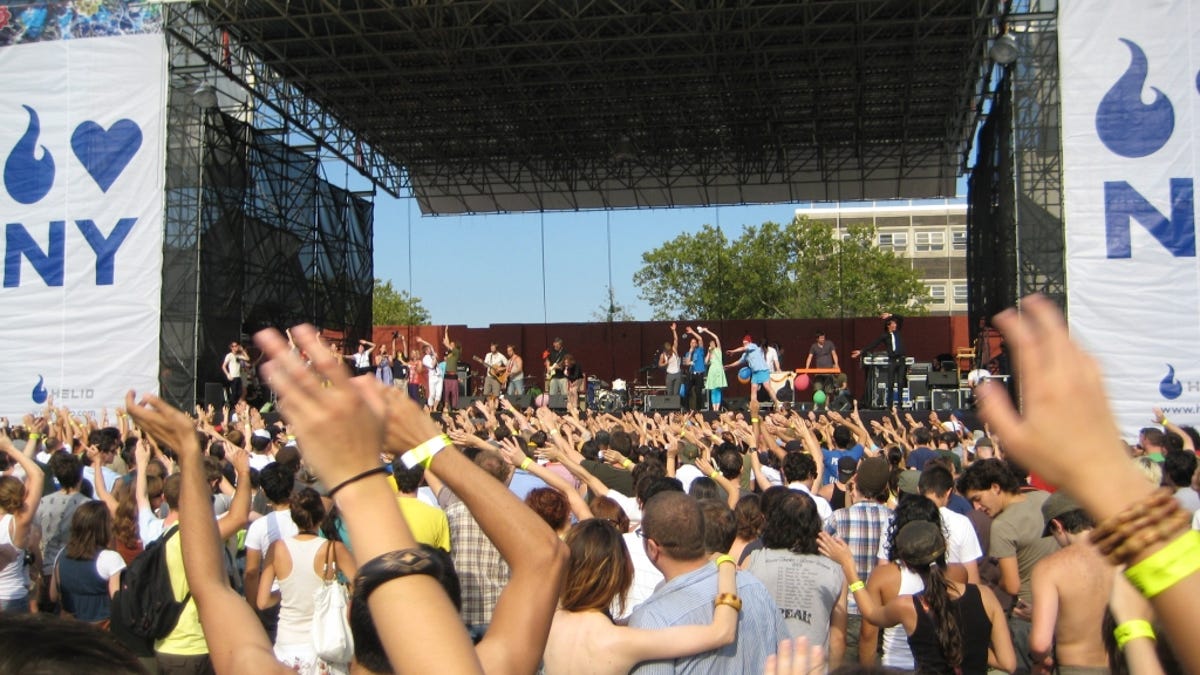Fake Steve Jobs, Banksy, and the cult of anonymity
Or, Bloggers Can Be Artists Too.

"See, Fake Steve Jobs was like the Banksy of blogging."
I was trying to explain to the guy standing next to me why I'd just flipped out. We were at McCarren Park Pool, a massive abandoned-natatorium-turned-concert-venue in the Brooklyn hipster hub of Williamsburg (a neighborhood which any New Yorker either loves or loathes). All summer, McCarren has hosted a series of "Pool Parties" concerts, sponsored by youth-oriented "social tech" brands like Helio and Going.com, and this past Sunday was no exception. Hordes of sunburned music fans in imitation Ray-Bans and shrunken plaid shirts had crowded into the drained swimming pool for performances by I'm From Barcelona and Blonde Redhead, and while they were batting around beach balls in the mosh pit, New York Times writer Brad Stone outed Fake Steve Jobs as Forbes editor Daniel Lyons.
Upon seeing the headline on my mobile Google Reader, I may have overreacted just a bit.
The guy next to me, meanwhile, had never heard of Fake Steve Jobs, so I attempted to draw a parallel between the satirical CEO blog and somebody whom any self-respecting Williamsburg concert-goer would have heard of: the British street artist Banksy, who's grown notorious for everything from putting up clever, often socially provocative graffiti to planting fake art in major museums. Banksy, unlike Fake Steve Jobs, has been "outed" over and over and nobody has stepped forward to acknowledge it. Wikipedia, consequently, has classified him as "pseudo-anonymous."
Guy Next To Me was indeed familiar with the Banksy phenomenon, gave me an "Oh, I get it" nod, and we returned to our poolside enjoyment of Blonde Redhead.
They are, of course, not entirely parallel. The major discrepancy between a Banksy and a Fake Steve Jobs is that Banksy's fan base generally acknowledges that the artist runs the risk of numerous criminal charges if he comes clean, and have shown a quiet respect toward keeping his identity a secret. Fake Steve Jobs, meanwhile, was the subject of feverish speculation to the point that attempting to discover his identity often became more important than the substance of the blog itself. I admit to having jumped on that bandwagon: at one point, I thought I had a watertight theory that Fake Steve was none other than Gawker Media founder Nick Denton. ("Watertight." Ha. Then I learned the truth while standing in a drained swimming pool. Karma!) But eventually, I got pretty sick of it. Like focusing on an actor's personal life rather than that person's cinematic talent, the Fake Steve Jobs over-speculation had grown tacky.
It's nothing new. So far, that same kind of rabid surmising has characterized just about every case of a high-profile blogger who's had his or her real-life identity exposed. There is, most notably, "Lonelygirl15," whose exposure by the Los Angeles Times was arguably the most-publicized case of a blogger identity revelation prior to Brad Stone's reveal of Fake Steve Jobs. The major difference here, though, is that Lonelygirl wasn't anonymous; she was an actress posing as a video blogger. It wasn't a case of anonymity, but rather an audience that had been fooled into believing a fictional character was real. Lonelygirl15, meanwhile, lives on--but her once-guerrilla antics have turned into a strikingly professionalized operation.
A more apt comparison to Fake Steve Jobs is probably Jessica Cutler, the anonymous Capitol Hill sex blogger who was uncovered by political blog Wonkette. But Cutler's teasing, exhibitionist nature made plenty of critics speculate that she had wanted to be outed for the attention and publicity, and she subsequently turned the "Washingtonienne" blog into a published work of salacious chick-lit. True, Daniel "Fake Steve" Lyons also has a book on the way in October, but Fake Steve's appeal is that he's over-the-top and fictional; the whole draw of Cutler's blog was that it was over-the-top and true. It's The Onion versus an Us Weekly blind-items column.
Maybe it's the bookish idealist in me, but I considered "The Secret Diary of Steve Jobs" to be legitimately well-done satire that was deeply connected to the author's anonymity, just as Banksy's politically-charged graffiti is largely dependent on the artist keeping his identity under wraps. I remain a bit disappointed that the blog community (myself included) pounced on the quest for Fake Steve as though he were another trashy exhibitionist blogger using pseudonyms. Personally, I would've liked to see him "end" the "Secret Diary" and then let himself be outed; in my opinion, things will have to change pretty significantly now that there's someone (and a big company behind him) to blame for any of Fake Steve's occasional edginess. The blog displays links back to Forbes; is Lyons still going to be able to get away with Fake Steve's tauting name-calling of "Squirrel Boy" (that's Google CEO Eric Schmidt, FYI) and the like? Will Forbes have to take the blame if the blog uses any more unspeakable epithets for Nick Denton? Critics now know where to point a finger; that's why Banksy can get away with what he does.
I might be totally wrong. Maybe Lyons--who surrendered to the Times without protest, it appears--will be able to sufficiently maintain Fake Steve's appeal. But I doubt it. Think of it this way: Sacha Baron Cohen can still put on his Borat mustache and accent, but now, nobody's going to mistake him for an actual Kazakhstani documentarian. It's the end of a (mini) era indeed.
And on a closing note: Those supposedly in-the-know McCarren Park Pool scenesters had absolutely no idea who Fake Steve Jobs was. Guess the blog community's a little smaller than I'd assumed.

